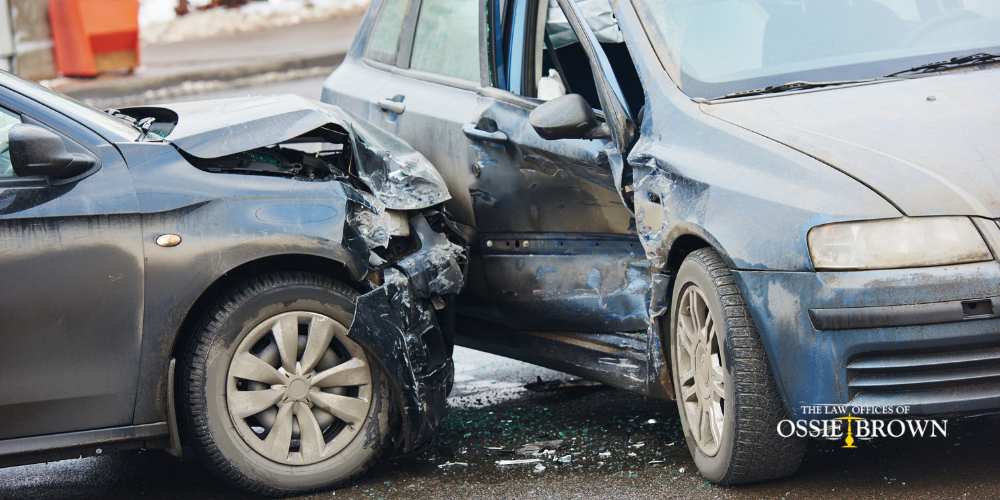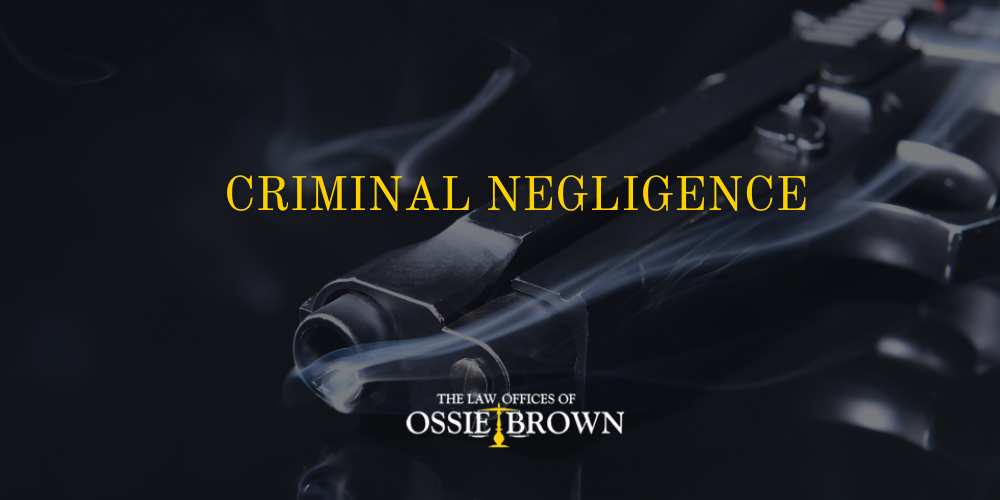Criminal negligence, or gross negligence, a far more serious form of negligence than civil negligence, means that a person acts recklessly, with a conscious objective, knowing the negligent act may come with an unjustifiable risk. Gross negligence or criminal negligence also means that any ordinary person would recognize the serious risk posed in the same situation, and therefore, would exercise reasonable care.
There are various acts with criminal negligence, all carrying serious penalties upon conviction. Our Baton Rouge criminal defense lawyers explain criminal negligence: what it is, how to prove it, how it differs from civil negligence, as well as potential defenses.
If you have been arrested or charged with criminal negligence, our Baton Rouge criminal defense lawyers can help obtain the best possible outcome for criminal cases involving criminal negligence. Call 225-343-1111 to schedule a free consultation at the Law Offices of Ossie Brown today.
What is Criminal Negligence in Louisiana?
Criminal negligence, also called gross negligence, occurs when someone acts in a way that creates a substantial and unjustifiable risk of bodily harm or death to others. When someone acts with criminal negligence, they are acting in a gross deviation from the standard of care that a reasonable person would recognize in the same situation. This is called the reasonable person theory.
Louisiana state law (RS 14:12) refers to the statute defining this criminal matter: criminal negligence is something that “exists when, although neither specific nor general criminal intent is present, there is such disregard of the interest of others that the offender’s conduct amounts to a gross deviation below the standard of care expected to be maintained by a reasonably careful man under like circumstances.”
Typically, most other states apply this same meaning to criminal negligence and related crimes.
Criminal Negligence Examples

Common examples of criminal negligence can include:
- Involuntary manslaughter
- Improperly storing a loaded gun under Louisiana’s gun laws
- Vehicular homicide from distracted or drunk driving
- Criminal neglect or endangerment of a child (such as leaving a small child in a hot car)
Criminally Negligent Homicide
In Louisiana, criminally negligent homicide is defined as the killing of someone through criminal negligence. The Louisiana Revised Statutes describe criminal negligence as a person’s failure to perceive a substantial and unjustifiable risk that the conduct will cause death or great bodily harm, where such failure constitutes a gross deviation from the standard of care that an ordinary citizen would exercise in the situation.
This offense is considered less severe than other forms of homicide, such as first-degree murder, second-degree murder, or manslaughter in Baton Rouge. This is because criminally negligent homicide lacks the element of intent to kill. However, it still represents a specific crime that acknowledges a person’s death resulted from another’s failure to act responsibly. Convictions can lead to significant penalties, including imprisonment, underscoring the state’s commitment to holding individuals accountable for reckless or negligent actions that result in loss of life.
Our lawyers have extensive experience, especially with vehicular homicide charges in Baton Rouge. Contact our law firm for a free consultation to learn more.
Criminal Neglect or Endangerment of a Child
Criminal neglect or endangerment of a child in Louisiana involves acts or omissions that place a child at risk of harm, including physical injury, emotional trauma, or neglect of basic needs. These charges carry severe penalties, and navigating the legal process can be overwhelming. A Baton Rouge child endangerment attorney provides skilled legal representation, helping to defend against accusations, protect parental rights, and ensure a fair legal process.
Elements of Criminal Negligence in Louisiana
The state must prove the following to show criminal negligence occurred in criminal cases:
The Person Acts Intentionally
Criminal negligence isn’t classified as simple carelessness. Such conduct must include reckless behavior, demonstrating a wanton disregard for human life. To be considered criminal negligence, the act must be a gross deviation from the reasonable care that a reasonable person would exercise in the same situation.
The Person Acts Knowingly Despite the Danger
The second element of criminal negligence applies to culpable mental states. For criminal negligence to apply, the person must act knowingly. The state must also prove that a reasonable person in the same or similar circumstances would recognize these obvious risks in these criminal cases.
For example, driving under the influence and causing a fatal accident reflects a blatant disregard for human life. The decision to drive while heavily intoxicated, knowing the serious risk involved, goes beyond a mere accident. Such behavior can lead to a conviction for criminally negligent homicide, as a reasonable person would recognize such a risk.
Criminal Negligence vs Recklessness in Louisiana
In many areas, recklessness and criminal negligence are often viewed as similar concepts. Reckless behavior involves actions that significantly risk bodily harm or death, where the individual consciously disregards the substantial risk of injury. However, some jurisdictions differentiate the two by stating reckless behavior requires actual understanding of the risk, whereas criminal negligence occurs when a person fails to understand but should have understood the obvious risks.
Despite their severity, neither criminal negligence nor recklessness is considered intentional harm.
Lousiana’s Criminal Negligence and General Intent Crime
Criminal negligence differs from traditional notions of intent in criminal law. Typically, to convict someone of most crimes, it must be shown they acted with “mens rea” or criminal intent, demonstrating intentionality or a specific mental state.
For instance, in Louisiana, the distinction between criminally negligent homicide and involuntary manslaughter lies in the degree of negligence or deviation from the standard set by law.
However, criminal negligence serves as an alternative to mens rea in some criminal cases, implying guilt when an individual’s actions carry a substantial risk of causing harm or death. This concept suggests that intent can be implied if someone commits an act with a substantial risk or unjustifiable risk, indicating an indirect willingness to put others in dangerous situations. something, or commit some other crime.
Many jurisdictions would then argue that criminal negligence is a form of “implied consent.” In other words, the intent is implied when the person acts in a way that causes a substantial and unjustifiable risk, such that an ordinary person would not.
Civil Negligence vs. Criminal Negligence

Civil negligence, often discussed in civil case proceedings, occurs when someone fails to act reasonably, leading to harm such as injury, death, financial loss, or damaged reputation. Civil negligence, which focuses on the failure to act according to the care expected, differs significantly from criminal negligence in the following:
Level of Proof Required for Criminal Negligence
Civil negligence differs from criminal negligence in the appropriate level of proof required to establish negligence.
In a civil case, a Baton Rouge personal injury attorney must prove that the negligent act occurred through a preponderance of the evidence. This means that the defendant, more likely than not, acted negligently in certain circumstances.
A criminal case requires a much higher standard of proof than just preponderance of the evidence. The prosecutor must prove that the defendant committed a criminal offense beyond a reasonable doubt in Lousiana. Beyond a reasonable doubt means that there is clear and convincing evidence that a defendant committed a specific crime, and there is no other reasonable explanation presented by the evidence in question.
Punishment for Criminal Negligence
Does indictment mean jail time in Louisiana?
The second major difference between criminal and civil negligence is the punishment. If a defendant is found guilty in a criminal case, they will be punished through jail time, fines, community service, license suspension, deferred adjudication in Louisiana, etc.
In a civil case, a defendant is punished not through prison time but by paying monetary damages to the plaintiff. Plaintiffs can recover damages (AKA financial compensation) for medical bills, lost wages, emotional distress, loss of consortium, funeral and burial expenses, and more.
Best Defense Strategies for Criminal Negligence
If a person commits criminal negligence, they need to hire an aggressive legal team that can formulate defenses based on the facts of the case. Baton Rouge criminal defense attorneys at the Law Offices of Ossie Brown can potentially use the following three defenses in your favor.
It Was an Accident or a Mistake
As previously explained, a crucial element of criminal negligence is that the defendant’s behavior is reckless and outrageous, causing a substantial and unjustifiable risk. Naturally, this is the angle at which many criminal defense teams start arguing first. Certain offenses can certainly be proven as an accident or a mistake with the right evidence.
No Knowledge
Remember, the other element of criminal negligence is that the person knew, or should have known, that their actions came with potentially deadly risks.
So the defense to this element would be to prove that the defendant didn’t know that their actions had major risks of injury or death. For example, some people with mental illnesses, disabilities, or traumatic brain injuries don’t always know that what they’re doing is considered dangerous. Therefore, they may receive reduced criminal charges and penalties for the crime they committed.
The Defendant is a Reasonable Person Who Did Act With Reasonable Care
The last main element of criminal negligence is that a person failed to exercise reasonable care in dangerous situations. If a criminal defense attorney can prove that the defendant did actually exercise reasonable care, then they may receive reduced criminal charges and penalties as well.
Baton Rouge Criminal Negligence Defense Attorney

If you’ve been charged or arrested for criminal negligence, it’s crucial that you hire an aggressive criminal defense law firm. Baton Rouge criminal defense lawyers at The Law Offices of Ossie Brown have decades of combined experience in defending their clients in a variety of criminal cases, including drug crimes, sex crimes, theft crimes, violent crimes, DUIs, and more.
Our law firm has what it takes to ensure that you receive the best possible case outcome, whether that is reduced criminal charges and penalties or a cleared name altogether. Above all else, you can trust that our experienced attorneys will defend your legal rights every step of the way. Call 225-343-1111 to schedule a free consultation with a criminal defense attorney at our law firm today.

